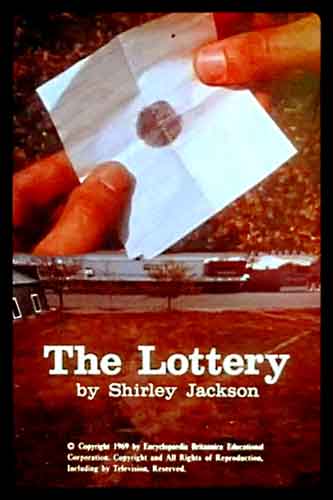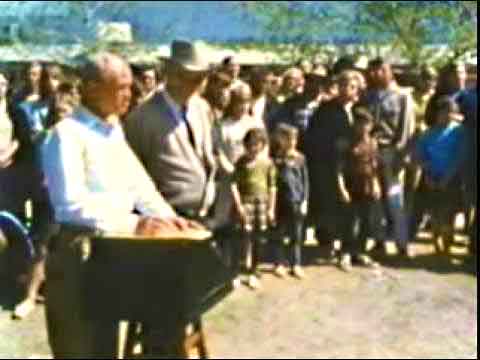 This 20 minute 1969 short, courtesy of the Encyclopedia Britannica Short Story Showcase series, is simply the best existing adaptation of Shirley Jackson’s classic story “The Lottery.” Accept no substitutes!
This 20 minute 1969 short, courtesy of the Encyclopedia Britannica Short Story Showcase series, is simply the best existing adaptation of Shirley Jackson’s classic story “The Lottery.” Accept no substitutes!
Shirley Jackson’s “The Lottery” is a nasty little tale about a barbaric ritual that occurs in a small American town much like Bennington, Vermont, where Jackson was living at the time. The story was first published in The New Yorker back in 1948, and inspired a fair amount of outrage. Since then, however, “The Lottery” has been acclaimed as a classic. Now widely taught in schools, it’s become one of the most iconic horror stories of the Twentieth Century, if not of all time.
Now widely taught in schools, it’s become one of the most iconic horror stories of the Twentieth Century, if not of all time.
This film adaptation by writer-producer-director Larry Yust, filmed on location in Fellows California, is said to be one of the bestselling “educational” films ever. It was packaged with a 10-minute supplemental video featuring USC professor Dr. James Durbin discussing the themes of the story, interspaced with extensive clips from the film.
It’s early June in an unnamed town, and the annual lottery is about to begin. The town’s three hundred residents have gathered around the middle aged Mr. Summers. There’s a solemn swearing-in ceremony in which Summers declares he’ll execute his duties as chairman of the lottery to the best of his ability, and then the event commences.
Yust eschews slickness with his asynchronous editing and abuse of the zoom lens, but what he imparts is a sense of ugly reality, which is the key to the film’s success.
In an increasingly somber, tension-filled atmosphere, Mr. Summers calls up all the men of the town to draw slips of paper from a box. The mood is broken only by an old man, who blathers that it’s his seventy-seventh year of attending the lottery, and recites the old mantra “Lottery in June, corn heavy soon.”
 Once the slips are drawn Mr. Summers asks the participants to show everyone their papers. All the papers, it turns out, are blank but for the one held by Bill Hutchison. The latter’s wife Tessie (who has shown up late) protests that her husband wasn’t given enough time to make a proper selection.
Once the slips are drawn Mr. Summers asks the participants to show everyone their papers. All the papers, it turns out, are blank but for the one held by Bill Hutchison. The latter’s wife Tessie (who has shown up late) protests that her husband wasn’t given enough time to make a proper selection.
No matter. Bill and his children step up to draw more slips from the box, as does the complaining Tessie. They show their papers around, and all are again blank but for one: Tessie’s, which has a big black dot. Thus Tessie is given the treatment previous “winners” have received: she’s surrounded by her fellow townspeople, all of whom pick up rocks and stone her to death.
Writer-producer-director Larry Yust brings much of the same off-kilter energy to this short that he did to the 1974 feature HOMEBODIES. This LOTTERY, unlike the other film adaptations (especially the awful 1996 TV movie), really captures the contrast between small town mundanity and primitive blood ritual that distinguished Shirley Jackson’s story.
 The atmosphere is unfailingly naturalistic, helped by the documentary-esque handheld camerawork. Yust eschews slickness with his asynchronous editing and abuse of the zoom lens, but what he imparts is a sense of ugly reality, which is the key to the film’s success.
The atmosphere is unfailingly naturalistic, helped by the documentary-esque handheld camerawork. Yust eschews slickness with his asynchronous editing and abuse of the zoom lens, but what he imparts is a sense of ugly reality, which is the key to the film’s success.
This LOTTERY, unlike the other film adaptations (especially the awful 1996 TV movie), really captures the contrast between small town mundanity and primitive blood ritual that distinguished Shirley Jackson’s story.
If there’s a problem it’s with the fact that, quite simply, the film is extremely dated. Although ostensibly set in the late forties (the period of the story), the fashions, hair styles and attitudes of the actors are all redolent of the 1960’s. This puts the horror of story at something of a remove, seeing as how it so obviously occurred 40 years ago. It would be nice if a more contemporary version of this chilling tale would appear that’s as good as this one, but see such a film has yet to appear.
Vital Statistics
THE LOTTERY
The Encyclopedia Britannica Educational Corporation
Director/Producer/Screenwriter/Editor: Larry Yust
Cinematographer: Isidore Mankofsky
Cast: Olive Dunbar, William “Billy” Benedict, William Fawcett, Joe Haworth, Ed Begley Jr., Jim Boles, Donna Bowen, Blanche Bronte, Alan Brown, Nancy Hale, Susan Healy
